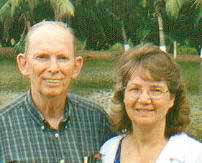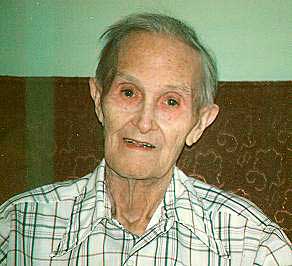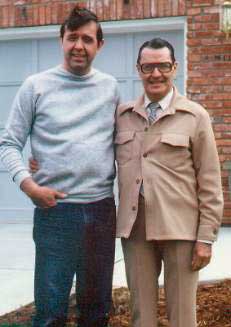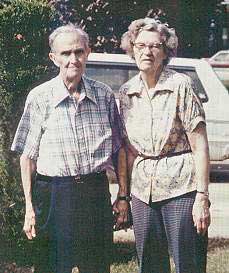RECOLLECTIONS OF BURTON AND HIRAM EVAN BARBER
Return to main Barber index
Burton Barber's father
By Ed Werner

Ed and Sharon Werner I first met brother Barber when I was about nine years old. He was the evening speaker at the Pawnee Lake Bible Camp near Guide Rock, Nebraska, where Dan Escritt was then preaching. The next summer, he was one of the speakers at a Family Camp near Maxwell, Nebraska, sponsored by the church in either Lexington or Cozad, Nebraska. It was about that time that my Dad, (Edward Werner), Henry and Wesley Shaw and others were very dissatisfied with the lack of convictions of the Christian Church in Deweese, Nebraska.
Dad was searching for something better. We even attended the Seventh Day Adventist Church in Hastings, Nebraska for a few weeks, but Dad soon realized that was not right, so he went back to the Christian Church in Deweese. Dad liked what he heard from brother Barber. At the family camp at Maxwell, Burton Barber was the main speaker. Our family was in one side of a duplex cabin and Ed and Nita McSpadden were in the other side. As I recall, the wall separating the two sided did not go all the way to the peak of the pitched roof. My brother David was less than a year old. The McSpaddens had a baby boy also named David who was also less than a year old. Between the two David's crying during the night, I got little sleep.
My Dad took us to nearly every singspiration and every revival meeting that was within a 75-100 mile radius of our farm home. I remember hearing brother Barber preach in several of those meetings. He held a protracted meeting in Superior, Nebraska to help Dan Escritt establish a new Church of Christ there. I heard brother Barber speak at Inavale, Nebraska and other places. This is how we became acquainted with the new Midwestern School of Evangelism in Ottumwa, Iowa. I believe that was in 1949. So that August, we drove to Cincinnati, Iowa to attend the Cincinnati Rally. It was held in a large auditorium in Cincinnati. I became a friend to "Billy" Estes and we sat together up in the balcony during the services. We could both sing parts, so during the song service, we traded off singing soprano, alto, and tenor. Those are pleasant memories. At that young age, I was fascinated with brother Barber's rapid-fire preaching. I listened intently so as not to miss a word he said.
A few years later, there was a family who were converted and attended the Church of Christ in Guide Rock, Nebraska. I believe Charles Dailey was preaching there at that time. The father's name was William Sherman Hill. They had 4 or 5 boys and one daughter. Every one of the sons were named William Sherman Hill! They gave each one nicknames to tell them apart; one being William, another Bill, another Sherman, etc. The father worked in Hastings, Nebraska, and one evening on his way home from work, he apparently did not see the train coming on the tracks just south of Hastings, and the engine hit his car broadside, killing him instantly! His wife was pregnant with another child at the time. She was devastated, and adopted all of her children out to other families. When the child she was carrying was born, she named him William Douglas Hill. While still a baby, the Barbers learned of the situation, and were able to adopt him as their son, and named him John Douglas Barber. Everyone called him "Dougy". Later, the Barbers were finally able to have a child of their own, another son, Burton Dale.
In 1956, 1 enrolled in the Midwestern School of Evangelism in Ottumwa, Iowa. Brother Barber was preaching every weekend in a new congregation which he had established in Centerville, Iowa. On Sunday mornings, he often preached in the church service held in the administration building at the school, and then made a hurried trip to Centerville, about 45 or 50 miles southwest of Ottumwa, for the morning preaching service there. I enjoyed all of my classes in the school, but brother Barber was my favorite instructor. His sermons were always filled with valuable information and very logically organized and delivered with such conviction. I took copious notes in stenographer's notebooks of nearly all the chapel sermons all four years of my schooling there. Brother Barber spoke often in chapel in the mornings. I have since then indexed those notes and I still sometimes refer to them in my studies.
Property was purchased on Pennsylvania Avenue and a nice church building was constructed. Brother Barber designed the entire building, which had a full basement under it. I, and several other young men from the boy's dorm helped put the roof on. Brother Barber also directed the choir for the January Gathering each year. It is now held in the month of February, so is now known as the February Gathering. At my graduation from M.S.E., in 1960, each of the Senior men graduates brought a message, and brother Barber brought the final message.
In either 1964 or 1965, I was living in Inglewood, California, and that Summer I travelled teaching in Bible Camps and holding revival meetings. On my way back from a camp in Florida, I stopped in Granite City, Illinois to see Delmar Rhodebeck, one of the men who was graduated with me from M.S.E. I was there for a Sunday church service. That same day, Burton and Opal Barber were there, on their way from Ottumwa to Puerto Rico to work with Gordon Thompson. That was the last time I saw brother Barber for many years.
Because of some very unfortunate circumstances when Burton was about 12 years old, his mother divorced his dad, and the boys had no knowledge of where their dad was for many decades. Burton eventually learned where his dad lived, and was able to visit him before he died.

Hiram Barber at 93 I was preaching in Lincoln, Nebraska when I learned that Burton's dad and his second wife lived only about 30 miles away in Crete, Nebraska. I wanted to meet the man, so I drove to Crete, and looked up the name Barber in the phone book. There were two listings under the name Barber. I chose the one listed as Hiram Barber, since that was the more "old-time" name, and drove to the address. There was an old man out in his attached garage, repairing an air compressor he had made years before. I walked up to him and introduced myself to him, and he invited me into his home. He was 91 years old at the time. When I told him that I knew Burton very well, and that Burton had been one of my instructors in the Midwestern School of Evangelism, he asked about each of his sons. I told him that Raymond had died years earlier, but that Burton and Royal were preachers and that Donald had preached some also.
When I told him about Burton, his preaching, the Midwestern School of Evangelism, where he was one of my instructors, the Voice of Evangelism he co-edited with Donald Hunt, his labors in Puerto Rico and other places, and the books and booklets he had edited and printed, Hiram, with tears in his eyes said, "I didn't know I had a son like that!" Hiram then immediately began telling me his side of the story about the divorce from his first wife Alma. After all those years, it was still a heart-ache to him, especially because of losing contact with all of his sons.
His story is that during the hard times of the late twenties, Burton's mother and dad lived in Missouri (perhaps Rolla), where he invented and manufactured items and then traveled from place to place selling them. He had a brilliant mind, and had made many inventions; I would guess at least 50 of them. He showed me many of the drawings and blueprints of things he had invented, manufactured and sold. Hiram Barber is the man who invented the "vice-grip". He did not have the money to have it patented. Another man who lived just 17 miles south of Crete in Dewitt, Nebraska by the name of Peterson, saw his design, stole the idea, patented it, and his company has manufactured vice-grip pliers ever since! But it was Burton's dad, Hiram, who invented them! He also invented sun visors for Model T's, and numerous other items.
Money was tight, and jobs were scarce, so he traveled considerably selling the things he manufactured. Burton's mother did not want him traveling so much, and complained continuously. He urged her to travel with him, but she would not. He explained that he did not know how to make enough money any other way to be able to support his family. One time she finally reluctantly went with him from their home in Missouri on his route selling his manufactured items. When they got as far as Grand Island, Nebraska, she told him to turn around and take her home or put her on the bus and let her go home to Missouri. She also told him that if he would not quit traveling selling his manufactured items, he was not to come home! So he didn't.

Dick and Burton Barber He later married a woman who was about 14 years younger than he. I believe she had worked as a maid for Alma in Missouri. Her name was Helen Lucille. I do not know her maiden name. They were married in 1931. They had two sons, Wilbur Eugene, called "Buster", and Arthur, who went by the name "Dick". Arthur was and may still be a commercial pilot, flying primarily freight aircraft. They lived in Victoria, Vancouver Island, British Columbia, Canada for many years. I believe they have moved to the states now. We used to get Christmas cards from them every year.. Dick went into partnership with his dad in the machine shop he had in Crete, Nebraska. He even invented and built most of the huge metal-working machines in his shop, himself.
Hiram and Helen told us that after they married, they regularly wrote cards, and letters and sent gifts to each of the children for their birthdays and at Christmas time. But everything they sent was returned unopened. Heart broken, they finally became so discouraged they quit sending anything. Hiram desperately wanted to keep in touch with his boys, but was continually rebuffed. His two sons by his second wife did not know they had half-brothers.
When Hiram was about 49 years old, he got a pilot's license, bought an Aeronca airplane and flew for many years hi the Civil Air Patrol. He told me of some of the harrowing experiences he had flying in horrible weather looking for lost planes that had gone down, etc. Once when he was learning to fly, he was practice landing at the Crete airport, and with Helen watching from the ground, he came in too low, and his landing gear caught the power lines and flipped the plane to the ground. Hiram's head went through the cloth covering of the plane, but except for a few bruises, he was okay. He fixed the plane and continued flying for many years. At one time he flew a doctor who practiced in Beaver City, Nebraska, near where he had grown up to many remote places in southwestern Nebraska.
There was no Church of Christ, nor even any Christian Church in Crete, so they just read their Bibles together every evening, and prayed together, but they eventually quit partaking of the Lord's Supper. They were thrilled when we offered to bring the Lord's Supper to them each Sunday afternoon. The first Sunday we took the Lord's Supper to him and Helen, as I passed the emblems, he held them for a moment, and before partaking, he said, sorrowfully, "It's been so long!" I brought a cassette tape of my Sunday morning sermon with us each week, and left it with them to listen to, and exchanged it with a new message each week. We usually sang some songs together with Shirley our daughter playing the piano. We did this for well over a year until his death at age 93.

Hiram and Helen Barber
He and Helen always dressed up for "church" every Sunday, and before we left their home, they always gave us $20. for their tithe and some candy to all of our children. They would stand in the front window of their home and wave to us until we drove out of sight. Shirley, once told me, "He's the cutest old man I have ever met." He had lost one of his index fingers in an accident years earlier, but he could still sit down to the piano and play it quite well, himself! Several months before his death, they both asked if they could place their membership with the Church of Christ in Lincoln, where I was then preaching. We were more than happy to include them among us. He died very suddenly of a massive heart attack in bed early one morning. Helen said he sat bolt upright with his eyes wide open and called her name. Then he fell back onto his pillow dead. I was called, and we hurried to Crete to be with Helen.
We arrived before the people from the mortuary arrived. The body I saw lying in that bed was a colorless shell of the vibrant Hiram Barber I had come to know and love. He had insisted that there be no funeral, and he wanted his body cremated and the ashes scattered. But his sons Dick and his wife Sharon, wanted a brief service at the funeral home, which I conducted. Helen had fibrosis of the lungs, and about four weeks after Hiram died, Helen passed away, too. On his 93rd birthday, several of the members of the church in Lincoln came to his house and had a birthday party for him. My sister Linda baked a birthday cake. Leroy Brennfoerder, one of our deacons suggested that we give him a birthday spanking. This little shrivelled up gentleman, with a wry smile asked Leroy, "You and who else??"
Burton's dad, Hiram Evan Barber was born in Oneida, Kansas, February 3, 1893, and died on July 27, 1985 in Crete, Nebraska. He was the next to the oldest child of William Curtis and Carrie Elizabeth Barber. All of Hiram's five younger brothers and sisters were born in Stamford, Nebraska, except the youngest sister, who was born in Precept, Nebraska. Those two towns are, or were several miles southeast of Beaver City, Nebraska, and only about ten miles apart. Hiram was less than 5 years old when the family moved to a farm between Stamford and Precept, Nebraska. That house is still standing. They lived there until Hiram was at least 16 or 17 years old. He was baptized into Christ in Sappa Creek by his older brother Errett, if I understood him correctly, who was a preacher in Precept (now a ghost town). Hiram was about 6 years younger than Errett. The family then moved to Sheridan, Wyoming. There Hiram met and married Alma Bauffinan sometime between 1910 and 1915. They moved to Missouri sometime in the early to mid 1920's. Burton's grandfather and grandmother were both graduates from Drake University in the late 1800's. At some point in his life, Hiram, Burton's dad, attended Cotner High School and College in Lincoln, Nebraska, as a young man. I don't have the details or the dates for that.
After his second marriage, they were living somewhere east or southeast of Nebraska, and he decided to move to Colorado, but his car broke down in Lincoln, Nebraska. Having little money, he found a job in Crete, Nebraska and lived there the rest of his life. There he established his business, manufacturing nearly anything that could be made out of metal. There was no "restoration church" of any kind in Crete, so Hiram and Helen did not go anywhere to church. As a result, their two sons married catholic girls. This was a heartache to them to the day they died. A few years after both of them died, we invited Burton to come to Lincoln for an evangelistic meeting. While there, we took Burton to Crete where he met his half-brother Dick and his wife Kathy. They have four sons. Burton had a great visit with them. Dick took us to the machine shop where he and his dad had worked together for years. Dick was still running the shop, and so far as I know still does.
One more heartache that Hiram had in his life, which I forgot to include earlier, had to do with his mother and father. They did not get along well at all. Hiram's dad (Burton's grandfather), William Curtis Barber and his wife Carrie Elizabeth, both attended Drake University. William Curtis preached for many years. He finally quit preaching because he could not support his family on what he made preaching. His sister had married a wealthy rancher in near Sheridan, Wyoming. She encouraged him to move to Sheridan where she helped him buy a farm. Hiram's mother was always gone with other ladies from the church and was not home much, leaving him to fend for himself. He tried to get her to stay home some and be a wife and mother, but she would not. He finally apparently became so depressed over his marital situation, that on July 4,1913, having urged her to stay home that day, she left anyway, so he disappeared. A little over a year later, his body was found in what Hiram called "an above ground cave" up in the mountains, made of rocks. Hiram believes he committed suicide. His body had been half eaten by wolves.
Edward E. Werner, 92621 Knutson Ln., Coos Bay, OR 97420.
Return to main Barber index